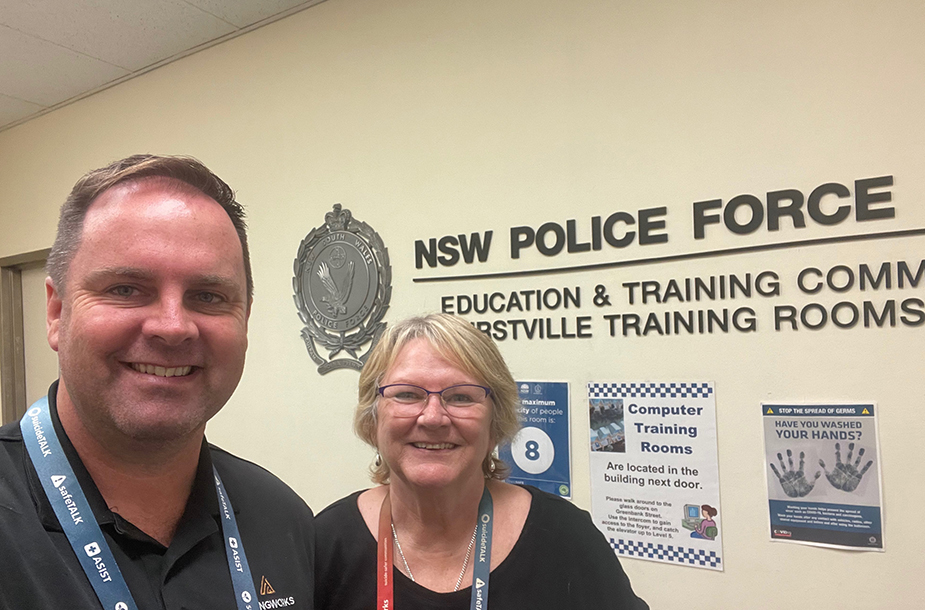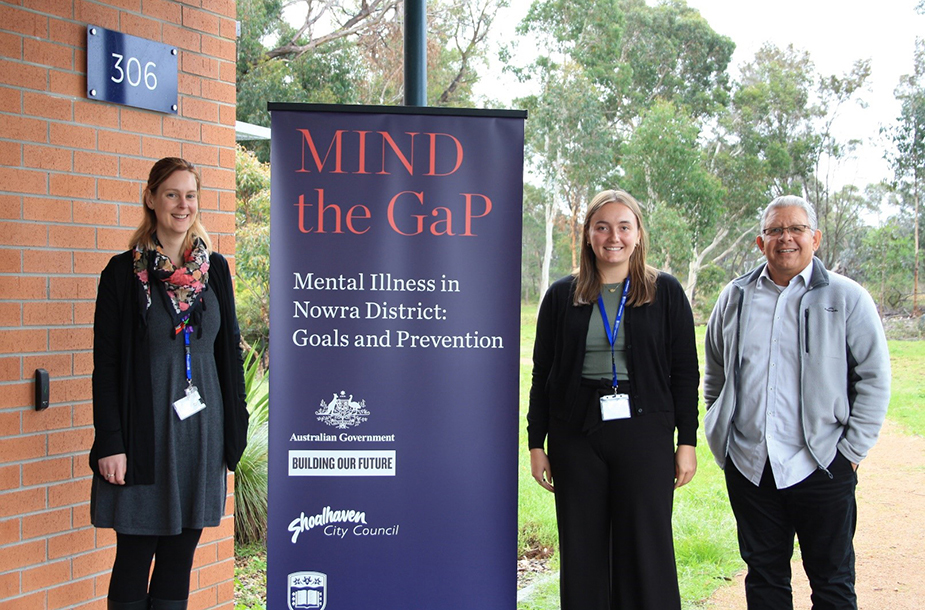 Left to right: Shayne Connell, LivingWorks CEO and Belinda Connell, LivingWorks Training Manager NSW and ACT after a recent workshop with NSW Police. First responders are a priority group for LivingWorks training under Towards Zero Suicides.
Left to right: Shayne Connell, LivingWorks CEO and Belinda Connell, LivingWorks Training Manager NSW and ACT after a recent workshop with NSW Police. First responders are a priority group for LivingWorks training under Towards Zero Suicides.
Work sites, schools, sports clubs, and more, often have first aid officers on hand to treat physical ailments, so imagine equivalent widespread support for those experiencing mental ill-health and suicidal distress.
Community Gatekeeper Training is striving to make this possible, driven by the belief that anyone, and everyone, can help to create safer communities.
Through the
Towards Zero Suicides initiative, a diverse range of community members (gatekeepers) are being taught how to identify a person’s suicide risk, start a conversation, and provide guidance towards professional care pathways.
LivingWorks is one of the training providers and is offering a variety of workshops that build what it calls a ‘Network of Safety’. Depending on a person’s time to commit to the training, or how much of a ‘helper’ role they want to take on, LivingWorks provides various workshop types. These start with an online 90-minute session to impart basic skills, and face-to-face workshops for either half a day (LivingWorks safeTALK) or two days (LivingWorks ASIST) for more advanced skills. Applied Suicide Intervention Skills Training (ASIST) is LivingWorks’s gold standard training, being an interactive workshop focusing on learning and practicing life-saving interventions.
“Not everybody can spare the time to do the full two days, but lots of people are able to do the half-day or online programs, and that’s a key part when we talk about creating suicide-safer communities,” says Belinda Connell, Training Manager NSW and ACT for LivingWorks. “It’s about providing real skills to work collaboratively with someone who is having thoughts of suicide and to help keep them safe.”
The training helps overcome one of the main barriers in providing suicide first aid – a fear of inadvertently doing or saying the wrong thing. Through practice, they build participants’ confidence in having a range of important conversations.
“The most common comment we get from participants is, ‘I wish I’d done this years ago; I never thought I could do this but I’m feeling really confident’,” Belinda adds. “And that’s what the training is about. There are lots of myths and barriers that have prevented people from reaching out to those they’re concerned about.
“It can be daunting to think, ‘Oh, I'm going to learn how to help someone thinking about suicide’ but it very quickly becomes something people understand they can do.”
LivingWorks has already worked with a broad range of people across the state, employing trainers with first-hand community connections to create a highly supportive and practical educational environment.
The training content also touches on the transition to formal mental health services. “Care is not one person’s responsibility,” Belinda concludes. “There is a community of informal helpers, formal helpers, resources, community resources, that come together to provide what a particular person needs.”
Bespoke support for Aboriginal communities in Shoalhaven
The University of Wollongong is another training provider participating in the Community Gatekeeper Training initiative via its MIND the GaP initiative, which brings together research, clinical training for health practitioners, and frontline services to support the mental health and wellbeing of the wider Shoalhaven community.
Administration Officer, Tiffany Bett says a bespoke, culturally-sensitive suicide prevention program was developed in consultation with community members and a local Indigenous facilitator to ensure it addresses specific issues and needs. There is also a research component led by two investigators, Professors Frank Deane and Mitch Byrne, evaluating the training’s effectiveness.
 Left to right: Tiffany Bett, MIND the GaP Client Services and Admin Officer; Jesse-Lee Regan, Community Linker Training Coordinator and Community Outreach Officer; and Glenn Williams, MIND the GaP Project Manager.
Left to right: Tiffany Bett, MIND the GaP Client Services and Admin Officer; Jesse-Lee Regan, Community Linker Training Coordinator and Community Outreach Officer; and Glenn Williams, MIND the GaP Project Manager.
“We’re looking to help bridge the gap between at-risk community members and professional services,” Tiffany says. “Our target is to train 200 ‘Community Linkers’ – currently, the number stands at 93. That includes quite a few of the South Coast Aboriginal Medical Service wellbeing staff, and we are also working with other service organisations in health and education.” While COVID disrupted the face-to-face training, a Zoom-delivered model was also developed. Groups typically ranged in size from 10 to 20 participants.
Glenn Williams, a psychologist of Aboriginal descent, is Project Manager for MIND the GaP and currently serves as both an advisor and investigator. He believes that cultural tailoring is critical to gaining traction and ensuring that sensitivities surrounding suicide prevention are observed.
“I think it’s paramount,” he says. “Being an Indigenous man myself, a lot of Indigenous people get taught to do things that don’t have any cultural aspect to it. But when we put in a cultural aspect to the training, it has a far greater reach and impact that goes deeper within the community.
“People start to feel they’ve been validated and that their culture is validated. We’re also aware that most Aboriginal people have been exposed to suicide, so we’re constantly on alert, watching and monitoring people to manage the risk.”
Glenn’s hope is that participants learn, understand and recognise some of the early signs that may lead to someone having suicidal thoughts: “If we can do that, I think we’ve provided a great service to the community.”
The Shoalhaven region has a large Aboriginal population and statistically ranks above the state average for deaths by suicide. MIND the GaP was therefore conceived to develop a regional model on addressing mental health. Glenn adds: “For me personally, one of the reasons I become a psychologist was so that I could be a resource to my community. I see that MIND the GaP is an extension of that. It’s providing a larger service that will continue to grow.
“The more we do, the more we try, the greater impact we’re going to have on not just the Aboriginal community, but the broader community as well.”
Community Gatekeeper Training is a NSW Heath
Towards Zero Suicides initiative.